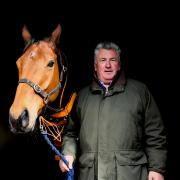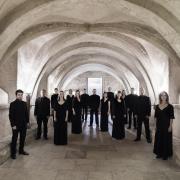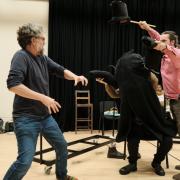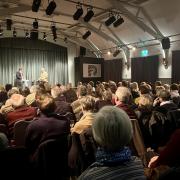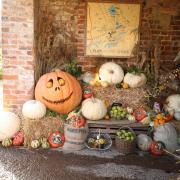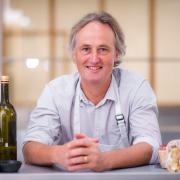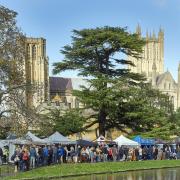Catherine Courtenay talks to television wildlife presenter, and Somerset obsessive, Martin Hughes-Games

“When I’m prime minister, the first thing that will happen is, if people get caught littering they will have one finger chopped off; a third offence and the whole hand will be chopped off…Do you think I’d be elected on that platform?” ponders Martin Hughes-Games.
Harsh words indeed, but the natural history TV producer and former BBC Springwatch presenter says them with a characteristic cheery note.
He’s talking of his passion for the natural world, and has just revealed a recent incident. “Some man threw a crisp packet from his car window and when we got to the lights I jumped out of my car and berated him.”
He says it with a slightly guilty air, as if his reaction was a bit naughty, begging the question: ‘What do you think?’ And, like most of us I suspect, I’m totally on his side. Of all people to jump out of a car and tell you off, Martin would be the one to have the greatest impact, such is his friendliness and likeability
Not long before I speak to him he’s been the focus of a social media outcry. The reason is his departure from the BBC Springwatch programmes which occurred last year; but fans watching the new series are missing him and have taken to Twitter to say so. Martin also misses being on the show, but appears remarkably calm about it all. He’s still in touch with co-presenters Michaela Strachan and Chris Packham, but seems resigned to the fact that, as he says, being white, male and middle class, he’s not the top choice for TV commissioners these days.
But, what is taking up his working time currently is his two-year-old son Sam – along with his life at home near Axbridge.
Sam, whose mum is wildlife film maker Jo Avery, is having a quiet time while we talk.
“I’m trying to get him interested in what’s around him and he is very interested and curious about the natural world,” says Martin. “He can tell me what colour a magpie is, but he’s too little to be confronted by the appalling things going on.”
Like many of us, Martin is very worried about the disappearance of the natural world. “Our human needs are always put above,” he says.
“Chris Packham sent me a text saying to keep trying and not to give up. It’s very easy to become hopeless.”
He adds: “Chris is an inspiration to me, he just keeps going and he puts his head above the parapet. I take my hat off to him he’s an amazing ambassador for conservation.”
Martin’s love of wildlife began at an early age.
He was born in Bristol but lived for 20 years near Stanton Drew. He went to St Peter’s School in Weston-super-Mare, and won a prize for nature when he was about eight.
“I didn’t have a mentor when I was young - it was my best mate Joe. We spent all the time we possibly could outdoors. I’d cycle over to Bishops Sutton where he lived and we’d make fires and get frogspawn and net trout.” He says the last words with a bit of a shudder, having become vegetarian while at university. “Animals are so beautiful and complex; I don’t want them killed for me.”
Martin went on to Millfield school in Street and, thanks to his inspirational teacher, Mr Cole, became obsessed with biology. “I was so thick when it came to chemistry and physics. But I found every aspect of biology completely gripping. I thought it was absolutely fantastic.”
He studied zoology at Reading University, then found himself in Bristol, where he became a painter and decorator – mainly to fund his other passion for motorbikes.
His big break with TV came through his friend Amanda Redman, who was part of a young acting crowd finding work with the BBC. Amanda told him that Bristol was where they made the natural history programmes. She introduced him to someone and, “I got in on the back of it – I got two weeks’ work.”
He worked for 30 years as a TV producer, mainly in the natural history unit, before eventually stepping in front of the camera for Springwatch, working for the series and its spin-offs for 12 years.
Martin believes that the extent of the loss of the world’s wildlife is not being fully examined in high profile natural history programmes. Instead, he feels, we are shown wonderful jungles and wild areas which are in reality small patches of reserve, in rapidly diminishing areas. Unless we know the truth, he says: “People won’t put any genuine effort into changing things.”
That said: “People don’t want to be banged on the head and told ‘this is awful’ all the time.”
But hanging out with Sam, watching children’s TV and its coverage of plastics pollution and other environmental issues, has been an eye opener he says.
“I watch CBeebies and they have very imaginative commissioners there, dealing with tough subjects – I was staggered by it. It’s very finger-on-the-pulse. This is the group of people we need to hit, and they are doing it in very imaginative ways.”
Do what you can, he urges; every bit helps, whether that’s putting up bird feeders or digging a pond.
He’s travelled the world in search of wildlife, but: “I am seriously obsessed with Somerset. I can see Glastonbury Tor in the distance from my garden.”
“It feels incredibly ancient to me,” he says, describing why he loves the county so much. Recalling filming programmes on prehistoric man down on the Levels, he reflects with a sense of awe on the atmosphere of the area, the Sweet Track Neolithic pathway at Westhay and “these wonderful submerged woods”.
“On top of that Somerset has amazing natural history – the starling murmurations – I still put them up there as some the greatest spectacles. And the sound of it, which you rarely experience on telly. Even from my house, when groups of them are heading back you hear this extraordinary ‘whoosh’ sound.”
Martin is a patron of Secret World Wildlife Rescue Centre at East Huntspill.
“I am so impressed with Secret World, particularly as they are non-selective.” He admires founder Pauline Kidner’s ethos that they will treat anything, but remain hard-headed about using euthanasia if necessary.
“It must be so difficult for them. They care massively and to have that hard-headed attitude means you care even more.”
Sam is on the move and it’s time for a biscuit. Martin is once more on dad duty – but it won’t be long before he’s back at the end of the garden, watching out for those starlings.
Martin’s favourite Somerset wildlife moments:
1. Seeing an Otter, in a small river; my senses were totally confused, I thought it was a dog swimming out in a pool under the trees, then suddenly I got it – an otter! It dived and despite rushing up and down the riverbank like a madman, I never saw it again.
2. Starlings on the Levels. The starling murmurations are a sight and sound that ranks with any wildlife spectacle I have seen anywhere in the world.
3. Adders at Priddy. I went up to Priddy with a brilliant reptile expert from India. In about 10 minutes he came back to my sons and I with something wriggling under his shirt, it was an adder with gleaming golden eyes. The boys were mesmerized as Rom showed them the adder’s fangs. He then let it go and we watched it flash away.
4. Earwig takes flight. I’m slightly obsessed with earwigs. We have four species. The common earwig never flies, even though it could! But I once discovered a lesser earwig on my finger in the riding stables after my lesson. To my astonishment it flicked out its fantastically complex folded wings and took off. I was hysterically excited, the girls at the riding school thought I had gone bonkers.
5. Woodcock coming in. In the cold half light of these wintery mornings I sometimes sit out with a cuppa and try to see the fantastically elusive woodcock returning to the woods around the house after a night’s foraging. It’s a fantastic thrill to catch a glimpse of one of these birds, some of which come to us in Somerset all the way from Russia.
6. Cheddar bat walk. I once went on a guided bat walk in Cheddar Gorge. It was totally brilliant, we all got given bat detectors and the eerie sound of dozens of horseshoe bats echolocating and socializing as they emerged from the caves sounded like an alien landing!
7. Other memorable spots are kingfishers, Muntjac and roe deer, 32 buzzards over my field and being ‘hunted’ by a peregrine falcon on my bike at Nyland Hill.
For more on Martin Hughes-Games, visit martinhughesgames.co.uk.



